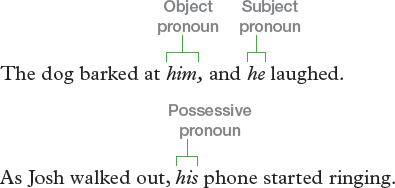Use the Right Type of Pronoun
Three important types of pronouns are subject pronouns, object pronouns, and possessive pronouns. Notice their uses in the following sentences.

TIP Never put an apostrophe in a possessive pronoun.
Pronoun Types
| SUBJECT | OBJECT | POSSESSIVE | |
|---|---|---|---|
| First- |
I/we | me/us | my, mine/our, ours |
| Second- |
you/you | you/you | your, yours/your, yours |
| Third- |
he, she, it | him, her, it | his, her, hers, its |
| who | whom | whose | |
| Third- |
they | them | their, theirs |
| who | whom | whose |
SUBJECT PRONOUNS
Subject pronouns serve as the subject of a verb.
You live next door to a coffee shop.
I opened the door too quickly.
OBJECT PRONOUNS
Object pronouns either receive the action of a verb or are part of a prepositional phrase. (For a list of common prepositions, see “Subjects” in Chapter 14.)
| OBJECT OF THE VERB | Jay gave me his watch. |
| OBJECT OF THE PREPOSITION | Jay gave his watch to me. |
POSSESSIVE PRONOUNS
Possessive pronouns show ownership.
Dave is my uncle.
Three trouble spots make it difficult to know what type of pronoun to use; compound subjects and objects; comparisons; and sentences that need who or whom.
PRONOUNS USED WITH COMPOUND SUBJECTS AND OBJECTS
A compound subject has more than one subject joined by and or or. A compound object has more than one object joined by and or or.
| COMPOUND SUBJECT | Chandler and I worked on the project. |
| COMPOUND OBJECT | My boss gave the assignment to Chandler and me. |
To decide what type of pronoun to use in a compound construction, try leaving out the other part of the compound and the and or or. Then, say the sentence aloud to yourself.

[Think: I went to the movies last night.]

[Between you and me is a prepositional phrase, so an object pronoun, me, is required.]
PRONOUNS USED IN COMPARISONS
Using the right type of pronoun in comparisons is particularly important because using the wrong type changes the meaning of the sentence. Editing comparisons can be tricky because they often imply (suggest the presence of) words that are not actually included in the sentence.
Bob trusts Donna more than I.
[This sentence means that Bob trusts Donna more than I trust her. The implied words are trust her.]
Bob trusts Donna more than me.
[This sentence means that Bob trusts Donna more than he trusts me. The implied words are he trusts.]
To decide whether to use a subject or object pronoun in a comparison, try adding the implied words and saying the sentence aloud.

[Think: The registrar is much more efficient than we are.]

[Think: Susan rides her bicycle more than he does.]
CHOOSING BETWEEN WHO AND WHOM
Who is always a subject; whom is always an object. If a pronoun performs an action, use the subject form who. If a pronoun does not perform an action, use the object form whom.
| WHO = SUBJECT | I would like to know who delivered this package. |
| WHOM = OBJECT | He told me to whom I should report. |
In sentences other than questions, when the pronoun (who or whom) is followed by a verb, use who. When the pronoun (who or whom) is followed by a noun or pronoun, use whom.

[The pronoun is followed by the verb played. Use who.]

[The pronoun is followed by another pronoun: I. Use whom.]